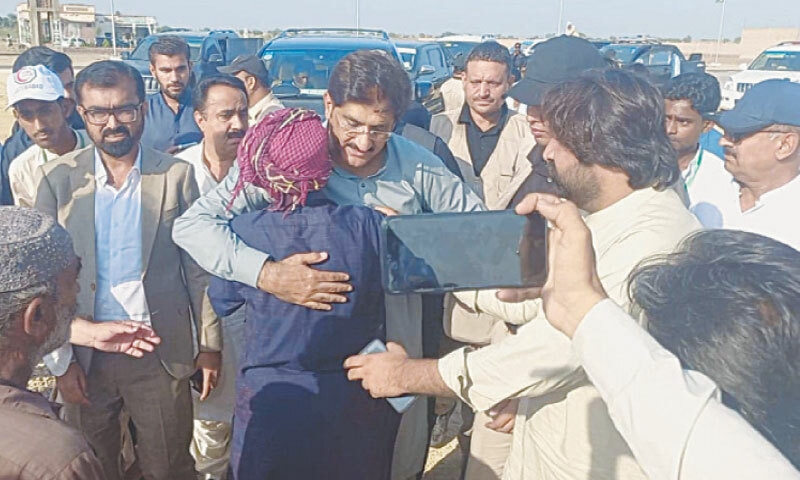LARKANA: Sindh Chief Minister Syed Murad Ali Shah on Wednesday visited rain and flood hit areas in Kashmore, Shikarpur and Jacobabad districts and said they were looking for ways to drive out stagnant floodwaters to the Indus River.
Talking to media persons in Jacobabad the chief minister said that entire province faced the problem of stagnant rainwater and most of peoples’ problems would be resolved after the water had been drained out from their areas.
He said that when the rainwater was drained out from Jacobabad it would definitely affect other areas as well. Total volume of rainwater on the right bank of the river would be driven into the river through Manchhar Lake where 14 feet water was currently stagnating, he said.
He dismissed reports about ‘influential’ persons’ intervention in drainage operation and called them unfounded. “My entire constituency was under water,” he said and added he would talk to Balochistan about the issue so that no one was hurt.
He said the government cared for every citizen. “I am here to review the post-rain situation and put in place a mechanism to safely drive out water from flooded areas,” he said.
Shah said that heavy rains had drastically affected rice crop and the government was making all-out efforts to facilitate farmers to cultivate wheat. “We need huge amount to launch relief and rehabilitation of rain-hit population in the province and only the Left Bank Outfall Drain requires Rs130 billion. We had approached Supreme Court to get Bahria project amount but the court had declined,” he said.
He said in answer to a question that there were no differences in PPP. “I am here only to visit the rain-hit areas and assess the scale of damage caused by downpour and extend help to the IDPs. I am trying my best to lessen the gravity of difficulties the marooned people are facing,” he said.
The chief minister was informed that eight union councils in Jacobabad were located in low-lying areas which submerged due to breaches in Heerdeen drain coming from Balochistan and forced people to take shelter on roads.
The breaches in Heerdeen drain should be plugged to drive out stagnant water. “I am here to review the situation and will talk to Balochistan government to find out its solution,” he said.
He said that he and irrigation minster were going to Balochistan to discuss ways and means to drive out stagnant floodwaters through Balochistan so that the issue could be resolved without damage to either side.
He visited a tent city in Benazir town in Shikarpur where about 350 IDPs were sheltered. He met IDPs and assured them of speedy efforts to arrange their early return to their homes.
Kashmore-Kandhkot deputy commissioner Munwar Mithani briefed the chief minister about the measures taken for relief and rehabilitation of the marooned people in the district.
He said the unprecedented rains had affected 159,731 acres of farmland in the district,
6,961 IDPs were accommodated in 27 camps where they were being provided cooked food, milk, mosquito nets and other items of daily use.
He said the IDPs had returned to the areas where floodwaters had receded while the rest were waiting to go back to their villages.
The chief minister was accompanied by acting governor of Sindh Agha Siraj Durrani, Sindh ministers Imtiaz Shaikh, Abid Bhayo, Shabir Ali Bijarani, MPA Ghulam Abid Sundrani, Jam Khan Shoro, Mukesh Kumar Chawla, Syed Nasir Shah and adviser Aijaz Jakhrani.
Flood victims protest
A large number of rain-hit people staged protest before the chief minister’s motorcade in Thull town and raised slogans against local administration.
The protesters said that the administration had failed to drain out rainwater from their localities. “Our children are dying of starvation and waterborne diseases as they are provided ration bags and proper medical help,” they said.
Many rain-hit people in Mirpur Mathelo and Daharki alleged that the chief minister was only visiting influential persons’ villages and did not bother to go to other villages.
Published in Dawn, September 22nd, 2022














































